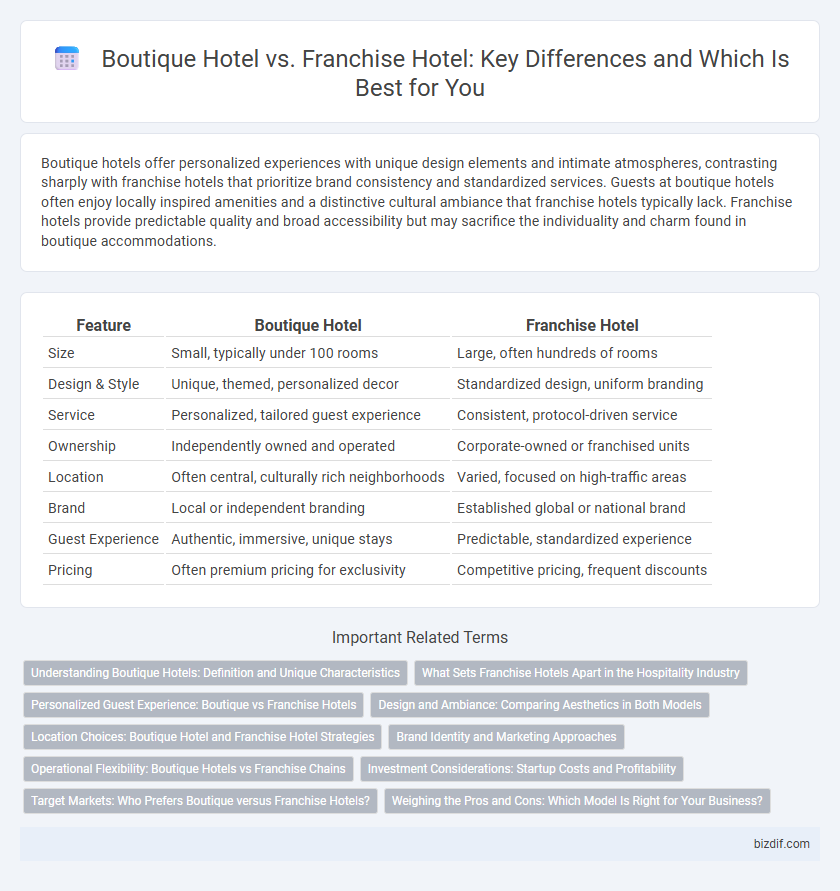Boutique hotels offer personalized experiences with unique design elements and intimate atmospheres, contrasting sharply with franchise hotels that prioritize brand consistency and standardized services. Guests at boutique hotels often enjoy locally inspired amenities and a distinctive cultural ambiance that franchise hotels typically lack. Franchise hotels provide predictable quality and broad accessibility but may sacrifice the individuality and charm found in boutique accommodations.
Table of Comparison
| Feature | Boutique Hotel | Franchise Hotel |
|---|---|---|
| Size | Small, typically under 100 rooms | Large, often hundreds of rooms |
| Design & Style | Unique, themed, personalized decor | Standardized design, uniform branding |
| Service | Personalized, tailored guest experience | Consistent, protocol-driven service |
| Ownership | Independently owned and operated | Corporate-owned or franchised units |
| Location | Often central, culturally rich neighborhoods | Varied, focused on high-traffic areas |
| Brand | Local or independent branding | Established global or national brand |
| Guest Experience | Authentic, immersive, unique stays | Predictable, standardized experience |
| Pricing | Often premium pricing for exclusivity | Competitive pricing, frequent discounts |
Understanding Boutique Hotels: Definition and Unique Characteristics
Boutique hotels are characterized by their intimate size, personalized service, and distinctive design, often reflecting local culture and artistic elements. Unlike franchise hotels, which prioritize brand standardization and large-scale operations, boutique hotels emphasize unique experiences and individuality. The independent ownership of boutique hotels allows for customized amenities and a strong sense of place, attracting travelers seeking authenticity and exclusivity.
What Sets Franchise Hotels Apart in the Hospitality Industry
Franchise hotels distinguish themselves in the hospitality industry through standardized branding, operational consistency, and extensive network support that ensures reliable guest experiences across multiple locations. They benefit from centralized marketing, reservation systems, and franchisee training, which drive higher scalability and brand recognition than boutique hotels. Unlike boutique hotels that emphasize unique, personalized ambiance, franchise hotels prioritize uniformity and efficiency to appeal to a broad customer base.
Personalized Guest Experience: Boutique vs Franchise Hotels
Boutique hotels prioritize personalized guest experiences through unique design, tailored services, and local cultural integration, creating a distinct and memorable stay for each visitor. Franchise hotels, while offering consistent standards and brand recognition, often follow standardized protocols that limit customization and personal interaction. The emphasis on individual attention in boutique hotels results in higher guest satisfaction and a more exclusive ambiance compared to the uniform experience of franchise hotels.
Design and Ambiance: Comparing Aesthetics in Both Models
Boutique hotels emphasize unique, locally inspired design and personalized ambiance, creating an intimate and distinctive guest experience through custom decor and thematic elements. Franchise hotels often feature standardized aesthetics and layouts to ensure brand consistency across locations, prioritizing uniformity over individuality. This contrast in design and ambiance highlights the boutique hotel's focus on originality versus the franchise model's emphasis on recognizable brand identity.
Location Choices: Boutique Hotel and Franchise Hotel Strategies
Boutique hotels prioritize unique, culturally rich locations that offer authentic local experiences, often situated in historic city centers or trendy neighborhoods to attract discerning travelers seeking distinctiveness. Franchise hotels focus on high-traffic, easily accessible areas such as airports, highways, and business districts to maximize brand visibility and consistent customer flow. Location choice for boutique hotels emphasizes exclusivity and local integration, while franchise hotels prioritize standardized convenience and broad market coverage.
Brand Identity and Marketing Approaches
Boutique hotels emphasize unique brand identity by offering personalized experiences and distinctive design elements that resonate with local culture, enhancing guest loyalty through storytelling and niche marketing strategies. Franchise hotels rely on standardized branding and widespread recognition, leveraging established marketing channels and loyalty programs to attract a broad customer base. Boutique hotels use targeted digital campaigns and social media engagement to highlight individuality, while franchise hotels focus on consistency and scalability across multiple locations.
Operational Flexibility: Boutique Hotels vs Franchise Chains
Boutique hotels offer greater operational flexibility by allowing personalized service, unique design choices, and tailored guest experiences that align closely with local culture and preferences. Franchise hotels operate under strict brand standards and centralized management systems, limiting the ability to adapt quickly to market changes or individual guest needs. This operational autonomy in boutique hotels often results in innovative offerings and enhanced guest satisfaction compared to the standardized services found in franchise chains.
Investment Considerations: Startup Costs and Profitability
Boutique hotels typically require higher initial investment due to unique design, personalized services, and prime locations, but they often yield higher profit margins through premium pricing and strong brand loyalty. Franchise hotels benefit from established brand recognition, streamlined operations, and reduced marketing costs, which can lower startup expenses and offer more predictable revenue streams. Investors must weigh the high capital and operational intensity of boutique hotels against the scalability and risk mitigation advantages of franchise models when assessing profitability prospects.
Target Markets: Who Prefers Boutique versus Franchise Hotels?
Boutique hotels appeal primarily to travelers seeking unique, personalized experiences with local character, often attracting millennials, couples, and leisure travelers who value design and intimate service. Franchise hotels target a broader market, including business travelers and families, who prioritize consistent quality, recognizable brands, and standardized amenities across multiple locations. The choice between boutique and franchise hotels depends largely on guest preferences for authenticity and individuality versus reliability and familiarity.
Weighing the Pros and Cons: Which Model Is Right for Your Business?
Boutique hotels offer a unique, personalized guest experience with distinctive design and localized charm, appealing to niche markets seeking authenticity, while franchise hotels provide established brand recognition, standardized operations, and extensive marketing support, facilitating quicker scalability and investor confidence. Independent boutique hotels face higher risks in brand building and market reach but enjoy greater creative freedom and the ability to adapt swiftly to market trends. Franchise models demand compliance with corporate standards and often higher upfront fees but benefit from proven business models and loyalty programs, making the choice dependent on business goals, capital availability, and desired market positioning.
Boutique Hotel vs Franchise Hotel Infographic

 bizdif.com
bizdif.com